Tennessee Firearm Bill of Sale Form
Each US state has legislation that, along with federal laws, regulates various actions with firearms, including the possession, use, carry, and others. You may need to get a Tennessee firearm bill of sale to conduct ownership transfer in this state. Find out helpful information on how to conduct the selling and buying transactions with firearms and whether the possessor must register one’s gun.
Tennessee bill of sale templates – this page will let you find out more about other bills of sale useful in Tennessee.
If you know what a bill of sale is but you want to make sure your knowledge is correct, look through our bill of sale guide – https://formspal.com/bill-of-sale/.
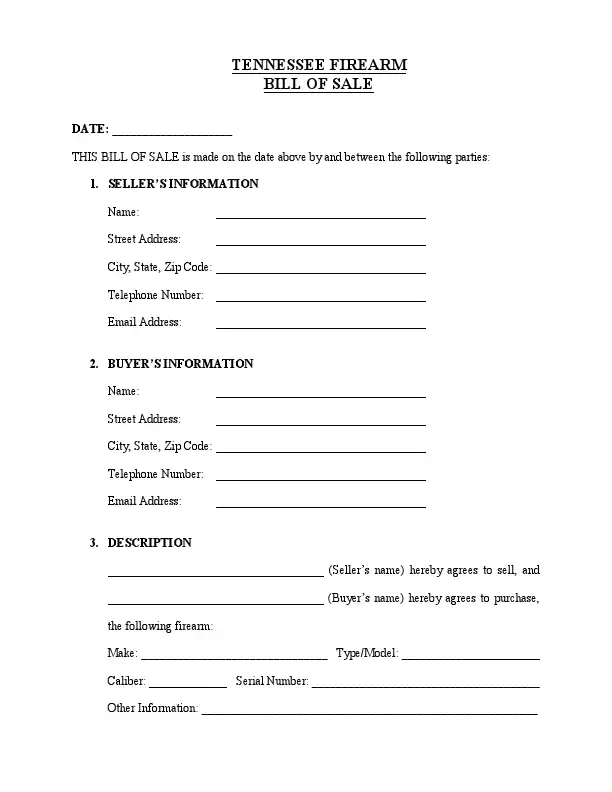
Build Your Document
Answer a few simple questions to make your document in minutes
Save and Print
Save progress and finish on any device, download and print anytime
Sign and Use
Your valid, lawyer-approved document is ready
How Can You Purchase a Firearm in Tennessee?
All actions that can be conducted with firearms, such as the possession, carry, purchase, sale, and others, are regulated by Tennessee Code Annotated and federal gun laws.
You can purchase a firearm in Tennessee from a licensed dealer. The dealer must initiate the background check in accordance with federal law by contacting the Tennessee Bureau of Investigation (TBI).
All licensed dealers are required to set an account with the TICS Unit for communications. You will complete and sign the ATF 4473 Form. The initial background check will be conducted either by phone or on the TICS WebAccess site. The transaction can be complete if the application has been approved. No registration of a firearm is required.
No background check is conducted if you purchase a firearm from another citizen of the state. Consider using a bill of sale template in this case. For your convenience and safety, you can find a free template of this form in a printable PDF format.
The document should include the following fields:
- The names of the buyer and the purchaser
- Date of the transaction
- Price of the sale
- A description of a firearm
The form must be signed by both parties of the transaction to be legal. Remember to check the ID of the other party to add authentic information to the bill of sale. Click here to get more details on how to fill out a firearm bill of sale correctly.
Tennessee Firearm Purchase Details
| Subject | Long Guns | Hand Guns |
| Registration of a Firearm | Not required | Not required |
| Permit to Purchase | Not required | Not required |
| Concealed Weapons Permit Fee | $100 ($50 if renewal) for 8 year enhanced | |
| Background Check for Private Sales | Not required | Not required |
| Persons Prohibited from Carrying Firearms | Tennessee Code Annotated, Section 39-17-1307(f)(1) | |
How Can You Sell Your Firearm in Tennessee?
If you wish to become a gun dealer, you must obtain a license first. If it is a single transaction, no special documentation is needed. Please familiarize yourself with regulations applied to the unlawful sale, loan or gift of firearm. In case of a private transfer, you are also recommended to use a properly filled-out bill of sale.
Do You Need a Permit to Carry a Firearm?
The state law requires you to obtain a permit to carry a firearm. Such permits are issued by the Department of Safety. You can apply for this permit online. Such a document does not allow carrying a firearm in prohibited places.
Download a Free Tennessee Firearm Bill of Sale Form
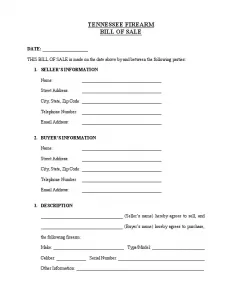
How to write a Tennessee Firearm Bill of Sale?
The guidelines below are based upon our sample Tennessee firearm bill of sale. Nevertheless, if there is a document available from your local officials, it’s advised to choose it during the deal.
Step 1: Indicate the document’s creation date.

Step 2: Provide the details of all parties (seller and buyer):
- Name
- Address: Street, City, State of residence, Zipcode
- Contact information: Mobile phone number, Valid email address

Step 3: Fill out the information about the vehicle that you’re selling:
- Manufacturer
- Caliber
- Type or model
- Serial number
- Other information
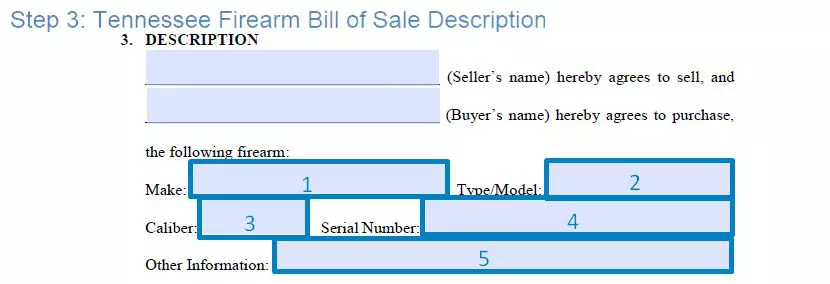
Step 4: Choose how the purchaser will buy the firearm and for how much.
This part also requires specifying the exact date of the purchase and the full amount decided upon by all parties of the transfer. After that’s been done, you need to specify the way of purchase:
- The overall sum at once. Nothing difficult here: the seller acquires the full sum from the buyer in one payment and presents the firearm to the purchaser within the same day.
- Trade-in. This choice enables the buyer to trade their gun (usually with a supplement) for the seller’s gun. The purchaser’s firearm description also has to be within the document (mentioning caliber, type, make, and serial number).
- In installments. Enter the deposit amount and the exact date when it must be paid, including the date by which the total amount has to be transferred to the seller.
- In the form of a gift. In this case, the purchaser does not pay money for the firearm.
Following that, choose one transaction method:
- Cash
- Check
- Cashier’s cheque
- Money order
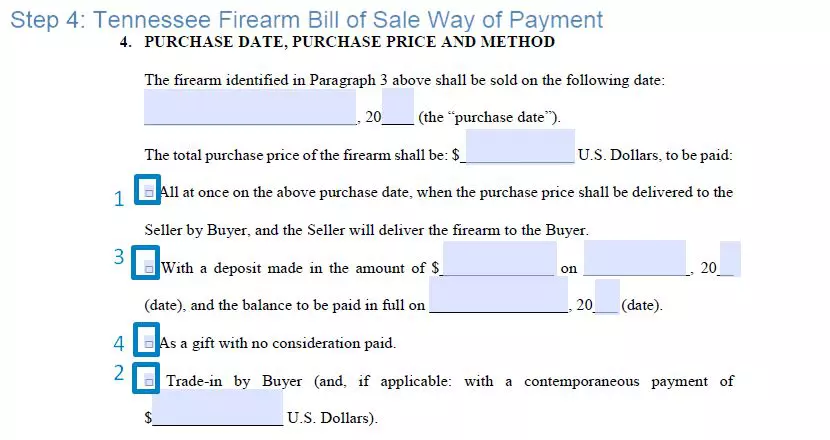
Step 5: Look at miscellaneous provisions.
This section usually has the “as-is” paragraph that means the firearm is offered without a warranty.

Step 6: Place your signature(s) in the corresponding areas.
In nearly all states, the signature of the buyer is not needed. However, you are more protected from legal problems if all sides sign the form. You can additionally have one or a few witnesses attest the transaction.
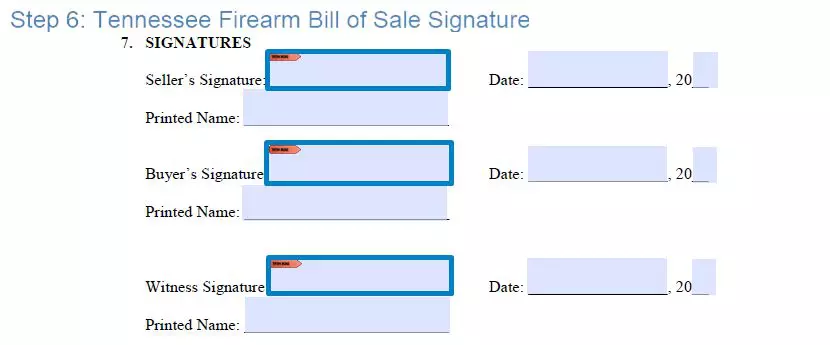
Step 7: Notarize the document
Although notarization is rarely necessary, it serves as another way to shield against legal difficulties. You will also feel safer if you keep the bill of sale in your personal records.
